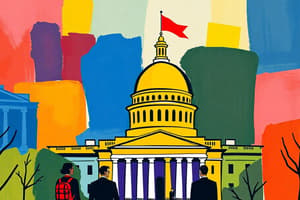Podcast
Questions and Answers
What is the origin of the word 'democracy'?
What is the origin of the word 'democracy'?
- It is of Egyptian origin
- It is of Chinese origin
- It is of Greek origin (correct)
- It is of Roman origin
Who once described democracy as the theory that the common people know what they want?
Who once described democracy as the theory that the common people know what they want?
- Socrates
- H.L. Mencken (correct)
- Aristotle
- Plato
What is considered necessary for consolidating a democracy?
What is considered necessary for consolidating a democracy?
- Creating political parties and alliances (correct)
- Avoiding any form of consensus building
- Building more military power
- Suppressing the voices of the people
Where did the idea of democracy originate?
Where did the idea of democracy originate?
What does democratization require in terms of control of the military?
What does democratization require in terms of control of the military?
What role do political parties play in democratization according to the text?
What role do political parties play in democratization according to the text?
Why is democracy considered the highest human achievement in political development?
Why is democracy considered the highest human achievement in political development?
'Demos' and 'Kratos' represent which concepts related to democracy?
'Demos' and 'Kratos' represent which concepts related to democracy?
'Democratization emerges from the political process of clash and compromise' implies that:
'Democratization emerges from the political process of clash and compromise' implies that:
'Democracy is a form of government in which the people have the authority to choose their governing legislators.' What does this statement imply?
'Democracy is a form of government in which the people have the authority to choose their governing legislators.' What does this statement imply?
Study Notes
Paleolithic Period
- Lasted from 2.5 million years ago to around 10,000 years ago
- Characterized by physical and cultural evolution of humans
- Significant advancements in technology, settlement patterns, religion, economy, and abstract culture
Tool Making
- Evidence of tool manufacture and use dates back to 2.5 million years ago
- Primarily made of stone and used for hunting, cutting, and scraping
Fire
- Discovery and control of fire was a major technological advancement
- Provided warmth, protection from predators, and a way to cook food
Art and Symbolism
- Upper Paleolithic period saw emergence of distinctive regional artistic traditions
- Includes paintings, sculptures, and musical instruments
- Cave paintings and carvings are some of the earliest known forms of human expression
Social Structure and Communication
- Development of complex social structures and communication methods
- Included development of language, rituals, and other social practices
Hunting and Gathering
- Early humans were primarily hunter-gatherers
- Developed strategies and tools for hunting game and gathering plant foods
- Required a deep understanding of the environment and seasonality
Settlement Patterns
- Early humans were nomadic, moving around to follow food sources
- Towards the end of the Paleolithic period, evidence of more permanent settlements
Diet and Lifestyle
- Diet consisted of meat, fish, fruits, vegetables, eggs, and nuts
- Excluded legumes, grains, most starches, refined sugars, and dairy products
- Lifestyle was nomadic, with people living in tribes and relying on hunting, fishing, and gathering
- Used rudimentary chipped stone tools and domesticated animals for food and clothing
First Civilizations
- Emerged in major river valleys, where floodplains contained rich soil and rivers provided irrigation and transportation
- Foundational civilizations developed urbanization and complexity without outside influence
Mesopotamia (8000-2000 B.C.)
- Cradle of civilization; Fertile Crescent
- Three main classes: government officials, nobles, and priests at the top; merchants, artisans, craftsmen, and farmers in the middle; prisoners of war and slaves at the bottom
- Commoners were considered free citizens and were protected by the law
- New techniques in handicraft and metallurgy
Ancient Egypt (3100-332 B.C.)
- The Black Land
Indus Valley (3300 B.C.E.- 1300 B.C.E.)
- a.k.a Harappan Civilization; Largest civilization of the Ancient world
Huang He (2100-1600 B.C.E.)
- China’s Sorrow
- The Huang He (Yellow River) Valley is the birthplace of Chinese Civilization
- Social Class/ city State - Aristocracy run by kings and upper class citizens
- Patriarchal society that stressed respect for parents and elders
- Architecture - Houses below ground to save fertile land for the upper class
- Brick and stone used for defensive walls, the arch for gates and bridges, and the vault for tombs
- Wooden architecture was the mainstay of traditional Chinese buildings
Democratization of Early Civilization
- The word “democracy” has a Greek origin
- Best form of government where leaders are elected by the people and are accountable to them
- Requires building political parties and alliances, establishing credible national agenda, and crafting a constitutional arrangement
Note: I have formatted the text into sections and used bullet points to highlight key facts and details from the original text.
Studying That Suits You
Use AI to generate personalized quizzes and flashcards to suit your learning preferences.
Description
Test your knowledge on how governments and states emerged as rulers gained control over larger areas, using writing and religion to maintain social hierarchies. Explore the development of the first civilizations in major river valleys, their urbanization, and complexity without outside influence.




